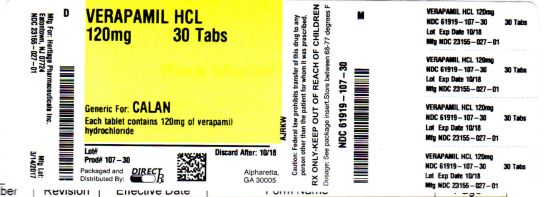Breast milk is superior in nutrition, It provides resistance against infections and allergies, It is naturally sterile. Despite all the advantages of breastfeeding some mothers choose to pause the breastfeeding in fear of harmful effects of medicines passing in breast milk. Are you wondering about breastfeeding and using Verapamil Hydrochloride | Direct Rx ? Know what is Verapamil Hydrochloride | Direct Rx and how it can affect your breast milk and whether Verapamil Hydrochloride | Direct Rx is safe for your kid or not.
What is Verapamil Hydrochloride | Direct Rx used for?
Verapamil hydrochloride tablets USP are indicated for the treatment of the following: Angina 1.Angina at rest including: -Vasospastic (Prinzmetal's variant) angina -Unstable (crescendo, pre-infarction) angina 2.Chronic stable angina (classic effort-associated angina) Arrhythmias 1.In association with digitalis for the control of ventricular rate at rest and during stress in patients with chronic atrial flutter and/or atrial fibrillation (see WARNINGS: ACCESSORY BYPASS TRACT ) 2.Prophylaxis of repetitive paroxysmal supraventricular tachycardia Essential hypertension Verapamil hydrochloride is indicated for the treatment of hypertension, to lower blood pressure. Lowering blood pressure reduces the risk of fatal and nonfatal cardiovascular events, primarily strokes and myocardial infarctions. These benefits have been seen in controlled trials of antihypertensive drugs from a wide variety of pharmacologic classes, including this drug. Control of high blood pressure should be part of comprehensive cardiovascular risk management, including, as appropriate, lipid control, diabetes management, antithrombotic therapy, smoking cessation, exercise, and limited sodium intake. Many patients will require more than one drug to achieve blood pressure goals. For specific advice on goals and management, see published guidelines, such as those of the National High Blood Pressure Education Program's Joint National Committee on Prevention, Detection, Evaluation, and Treatment of High Blood Pressure (JNC). Numerous antihypertensive drugs, from a variety of pharmacologic classes and with different mechanisms of action, have been shown in randomized controlled trials to reduce cardiovascular morbidity and mortality, and it can be concluded that it is blood pressure reduction, and not some other pharmacologic property of the drugs, that is largely responsible for those benefits. The largest and most consistent cardiovascular outcome benefit has been a reduction in the risk of stroke, but reductions in myocardial infarction and cardiovascular mortality also have been seen regularly. Elevated systolic or diastolic pressure causes increased cardiovascular risk, and the absolute risk increase per mmHg is greater at higher blood pressures, so that even modest reductions of severe hypertension can provide substantial benefit. Relative risk reduction from blood pressure reduction is similar across populations with varying absolute risk, so the absolute benefit is greater in patients who are at higher risk independent of their hypertension (for example, patients with diabetes or hyperlipidemia), and such patients would be expected to benefit from more aggressive treatment to a lower blood pressure goal. Some antihypertensive drugs have smaller blood pressure effects (as monotherapy) in black patients, and many antihypertensive drugs have additional approved indications and effects (e.g., on angina, heart failure, or diabetic kidney disease). These considerations may guide selection of therapy.
Verapamil Hydrochloride | Direct Rx while breastfeeding safe or not? Can there be any side effects for infant while using it during breastfeeding?
Verapamil hydrochloride is the only one ingredient used in manufacturing of Verapamil Hydrochloride | Direct Rx, Which makes it easier to analyze its effect in breastfeeding. As per our analysis of Verapamil hydrochloride it is safe to use Verapamil Hydrochloride | Direct Rx while lactating. We suggest you to check further details below about Verapamil hydrochloride usage in breastfeeding.
Verapamil Hydrochloride | Direct Rx Breastfeeding Analsys
SafeCAS Number: 152-11-4
It is excreted in breast milk in clinically non-significant amount and no problems have been observed in infants whose mothers were receiving this treatment.Plasma levels in these infants were undetectable or very low. Verapamil may induce to an increase of plasma Prolactin levels. American Academy of Pediatrics: usually compatible with breastfeeding medication.WHO List of Essential Medicines 2002: compatible with breastfeeding.
Verapamil Hydrochloride | Direct Rx Breastfeeding Analsys - 2
CAS Number: 52-53-9
Limited information indicates that maternal doses of verapamil up to 360 mg daily produce low levels in milk and newborns may have detectable verapamil serum levels, but levels are low. Verapamil would not be expected to cause any adverse effects in breastfed infants, especially if the infant is older than 2 months.
What if I already have used Verapamil Hydrochloride | Direct Rx?
It is always a good idea to keep your healthcare provider or doctor informed about your drug usage during pregnancy and breastfeeding but if you have not informed your doctor about Verapamil Hydrochloride | Direct Rx and have used it then do not panic as Verapamil Hydrochloride | Direct Rx is mostly safe in breastfeeding and should not cause any harm to your baby.
I am nursing mother and my doctor has suggested me to use Verapamil Hydrochloride | Direct Rx, is it safe?
Definitely, Verapamil Hydrochloride | Direct Rx is safe in lactation for baby. No wonder your doctor has recommended it.
If I am using Verapamil Hydrochloride | Direct Rx, will my baby need extra monitoring?
No extra baby monitoring required while mother is using Verapamil Hydrochloride | Direct Rx
Who can I talk to if I have questions about usage of Verapamil Hydrochloride | Direct Rx in breastfeeding?
US
National Womens Health and Breastfeeding Helpline: 800-994-9662 (TDD 888-220-5446) 9 a.m. and 6 p.m. ET, Monday through Friday
UK
National Breastfeeding Helpline: 0300-100-0212 9.30am to 9.30pm, daily
Association of Breastfeeding Mothers: 0300-330-5453
La Leche League: 0345-120-2918
The Breastfeeding Network supporter line in Bengali and Sylheti: 0300-456-2421
National Childbirth Trust (NCT): 0300-330-0700
Australia
National Breastfeeding Helpline: 1800-686-268 24 hours a day, 7 days a week
Canada
Telehealth Ontario for breastfeeding: 1-866-797-0000 24 hours a day, 7 days a week
Drug Brands with same Active ingredients


